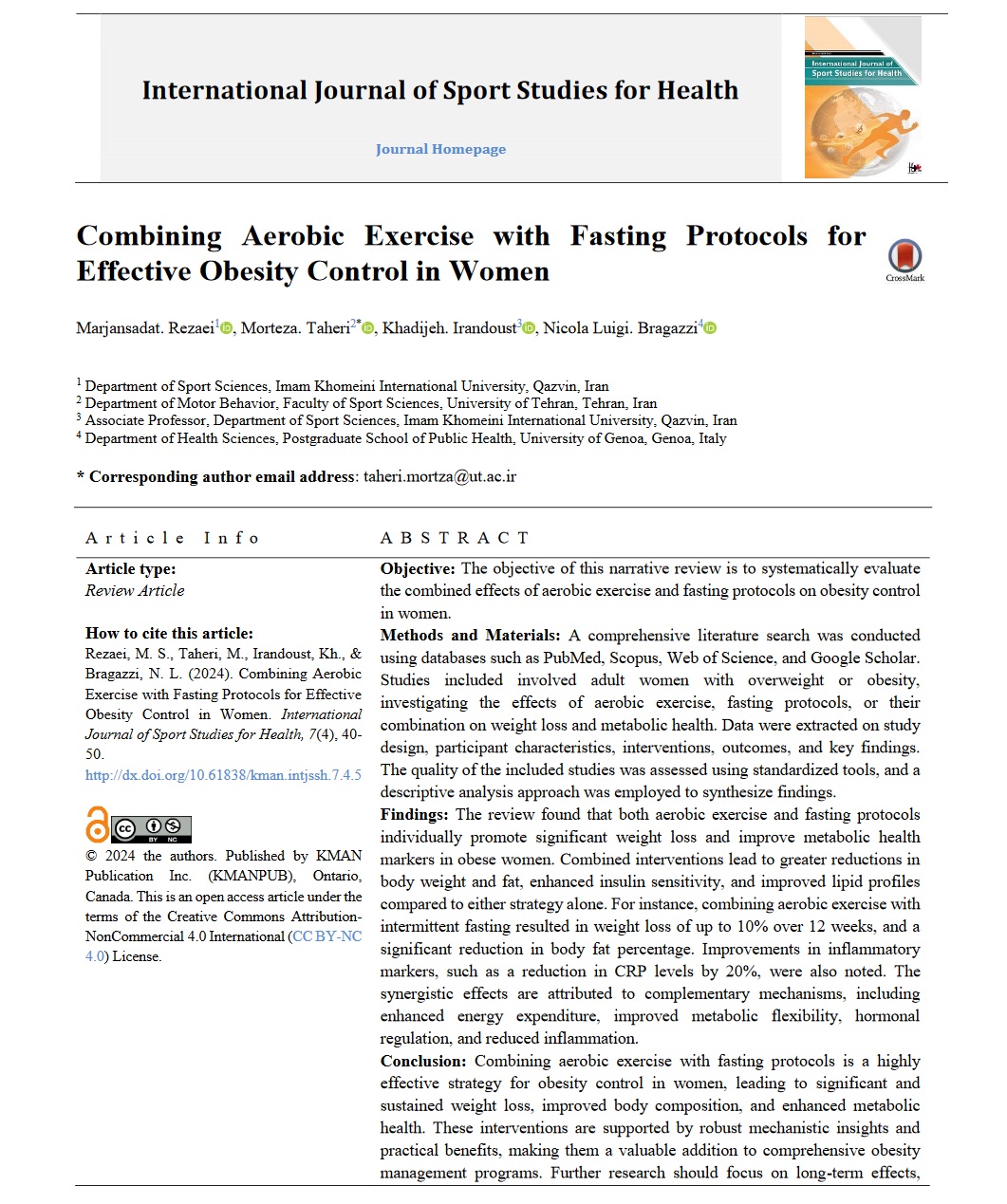Combining Aerobic Exercise with Fasting Protocols for Effective Obesity Control in Women
Keywords:
Aerobic Exercise, Fasting Protocols, Obesity Control, Women, Weight Loss, Metabolic Health, Insulin Sensitivity, Inflammation, Body CompositionAbstract
Objective: The objective of this narrative review is to systematically evaluate the combined effects of aerobic exercise and fasting protocols on obesity control in women.
Methods and Materials: A comprehensive literature search was conducted using databases such as PubMed, Scopus, Web of Science, and Google Scholar. Studies included involved adult women with overweight or obesity, investigating the effects of aerobic exercise, fasting protocols, or their combination on weight loss and metabolic health. Data were extracted on study design, participant characteristics, interventions, outcomes, and key findings. The quality of the included studies was assessed using standardized tools, and a descriptive analysis approach was employed to synthesize findings.
Findings: The review found that both aerobic exercise and fasting protocols individually promote significant weight loss and improve metabolic health markers in obese women. Combined interventions lead to greater reductions in body weight and fat, enhanced insulin sensitivity, and improved lipid profiles compared to either strategy alone. For instance, combining aerobic exercise with intermittent fasting resulted in weight loss of up to 10% over 12 weeks, and a significant reduction in body fat percentage. Improvements in inflammatory markers, such as a reduction in CRP levels by 20%, were also noted. The synergistic effects are attributed to complementary mechanisms, including enhanced energy expenditure, improved metabolic flexibility, hormonal regulation, and reduced inflammation.
Conclusion: Combining aerobic exercise with fasting protocols is a highly effective strategy for obesity control in women, leading to significant and sustained weight loss, improved body composition, and enhanced metabolic health. These interventions are supported by robust mechanistic insights and practical benefits, making them a valuable addition to comprehensive obesity management programs. Further research should focus on long-term effects, optimal protocols, and diverse populations to refine and expand the application of these combined approaches.
Downloads
References
1. Ahooghalandary S. Effect of Water Aerobics on Body
Mass Index, Lipid Profile, and Atherogenic Factors of MiddleAged Obese Women. Jundishapur Journal of Medical Sciences.
2022;21(5):638-49. [DOI]
2. Gharib NM. Vacuum Therapy Versus Abdominal
Exercises on Abdominal Obesity. International Journal of
Physiotherapy. 2016;3(3). [DOI]
3. Arikawa AY, Thomas W, Schmitz KH, Kurzer MS.
Sixteen Weeks of Exercise Reduces C-Reactive Protein Levels in
Young Women. Medicine & Science in Sports & Exercise.
2011;43(6):1002-9. [PMID: 21085036] [DOI]
4. Kim D-Y, Jung S-Y. Effect of Aerobic Exercise on Risk
Factors of Cardiovascular Disease and the Apolipoprotein B /
Apolipoprotein a-1 Ratio in Obese Woman. Journal of Physical
Therapy Science. 2014;26(11):1825-9. [PMID: 25435709]
[PMCID: PMC4242964] [DOI]
5. Choo J, Lee J-Y, Cho J-H, Burke LE, Sekikawa A, Jae
SY. Effects of Weight Management by Exercise Modes on Markers
of Subclinical Atherosclerosis and Cardiometabolic Profile Among
Women With Abdominal Obesity: A Randomized Controlled Trial.
BMC Cardiovascular Disorders. 2014;14(1). [PMID: 25011384]
[PMCID: PMC4105524] [DOI]
6. Eizadi M, Farbod M, Goodarzi MT, Afsharmand Z.
Improved Glucose and IL-6 by Aerobic Training Despite No
Change in Insulin and Insulin Resistance in Obese Women.
Avicenna Journal of Medical Biochemistry. 2017;5(2):70-5. [DOI]
7. Kareem H, Khalil NKM, Badr NM, El-Shamy F. The
Effect of Exercise on Insulin Resistance in Obese Women With
Polycystic Ovary Syndrome. The Egyptian Journal of Internal
Medicine. 2014;26(3):110-5. [DOI]
8. Hanafy H, Kamar E, Ahmed S, kamel h-e. Effect of
Ketogenic Diet and Exercise on Lipid Profile on Obese
Postmenopausal Women. Egyptian Journal of Physical Therapy.
2022;11(1):10-20. [DOI]
9. Janssen I, Fortier AH, Hudson R, Ross R. Effects of an
Energy-Restrictive Diet With or Without Exercise on Abdominal
Fat, Intermuscular Fat, and Metabolic Risk Factors in Obese
Women. Diabetes Care. 2002;25(3):431-8. [PMID: 11874926]
[DOI]
10. Cho Y-H. Effects of Intra-Session Exercise Sequence and
Circadian Rhythms on Physical Capacity and Sleep Quality in
Obese Women. 2024. [DOI]
11. Kurniawati M. Physiological Impact of Aerobic Exercise
During Fasting on Inflammatory Risk Factors in Obese Women.
Retos. 2024;55:289-95. [DOI]
12. Yoon J-r, Ha G-C, Ko K-J, Kang S-J. Effects of Exercise
Type on Estrogen, Tumor Markers, Immune Function, Antioxidant
Function, and Physical Fitness in Postmenopausal Obese Women.
Journal of Exercise Rehabilitation. 2018;14(6):1032-40. [PMID:
30656166] [PMCID: PMC6323343] [DOI]
13. Jang S-H, Paik I-Y, jaehoon R, Lee TH, Dae-Eun K.
Effects of Aerobic and Resistance Exercises on Circulating Apelin12 and Apelin-36 Concentrations in Obese Middle-Aged Women:
A Randomized Controlled Trial. BMC Women S Health.
2019;19(1). [PMID: 30696454] [PMCID: PMC6352322] [DOI]
14. Octaviana R, Hidayatullah MF, Kristiyanto A. Effect of
Low-Impact Aerobic Dance and Zumba Exercises on Body Fat
Percentage in Obese Women. Malaysian Journal of Public Health
Medicine. 2020;20(1):160-6. [DOI]
15. Yaprak Y, Durgun B, Kurdak SS. The Effects of Upper
Body Muscle Strength Training on Anthropometric Measurements
and Cardiopulmonary Function in Obese Women. Journal of
Physical Therapy Science. 2010;22(2):161-6. [DOI]
16. Mestek ML, Westby CM, Guilder GPV, Greiner JJ,
Stauffer BL, DeSouza CA. Regular Aerobic Exercise, Without
Weight Loss, Improves Endothelium‐dependent Vasodilation in
Overweight and Obese Adults. Obesity. 2010;18(8):1667-9.
[PMID: 20057377] [DOI]
17. Alinoori F, Shakib MH, Husseini L. Six Weeks Aerobic
Training Can Not Affect Serum Interleukin-1 Beta in
Obese/Overweight Females. International Journal of Biosciences
(Ijb). 2014;5(1):467-73. [DOI]
18. Morimoto M, Kosaki K, Myoenzono K, Yoshikawa T,
Park J, Kuro-o M, et al. Effect of Aerobic Exercise Training on
Circulating Fibroblast Growth Factor-21 Response to Glucose
Challenge in Overweight and Obese Men: A Pilot Study.
Experimental and Clinical Endocrinology & Diabetes.
2022;130(11):723-9. [PMID: 35850467] [DOI]
19. Jouzi Z. Comparison of Aerobic and Resistance
Exercises on Myonectin Levels and Insulin Resistance in
Overweight and Obese Women. Modern Care Journal. 2023;21(3).
[DOI]
20. Wang L, Zhang L. Effects of Aerobic-Anaerobic
Exercise on Social Avoidance, Positive and Negative Affects, and
Self-Consciousness of Obese Women. Iranian Journal of Public
Health. 2022. [DOI]
21. Magro-Malosso ER, Saccone G, Mascio DD, Tommaso
MD, Berghella V. Exercise During Pregnancy and Risk of Preterm
Birth in Overweight and Obese Women: A Systematic Review and
Meta‐analysis of Randomized Controlled Trials. Acta Obstetricia
Et Gynecologica Scandinavica. 2017;96(3):263-73. [PMID:
28029178] [DOI]
22. Megakli T, Vlachopoulos SP, Theodorakis Y. Effects of
an Aerobic and Resistance Exercise Intervention on Health‐Related
Quality of Life in Women With Obesity. Journal of Applied
Biobehavioral Research. 2016;21(2):82-106. [DOI]
23. Vizvari E, Farzanegi P, Zade HA. Effect of Moderate
Aerobic Exercise on Serum Levels of FGF21 and Fetuin a in
Women With Type 2 Diabetes. Medical Laboratory Journal.
2020;14(6):17-22. [DOI]
24. Lee K, Tripathy D, Demark‐Wahnefried W, Courneya
KS, Sami N, Bernstein L, et al. Effect of Aerobic and Resistance
Exercise Intervention on Cardiovascular Disease Risk in Women
With Early-Stage Breast Cancer. Jama Oncology. 2019;5(5):710.
[PMID: 30920602] [PMCID: PMC6512455] [DOI]
25. Pranoto A. Aerobic Exercise Increases Release of
Growth Hormone in the Blood Circulation in Obese Women.
Retos. 2023;51:726-31. [DOI]

Downloads
Additional Files
Published
Submitted
Revised
Accepted
Issue
Section
License
Copyright (c) 2024 Marjansadat Rezaei, Morteza Taheri, Khadijeh Irandoust, Nicola Luigi Bragazzi (Author)

This work is licensed under a Creative Commons Attribution-NonCommercial 4.0 International License.







